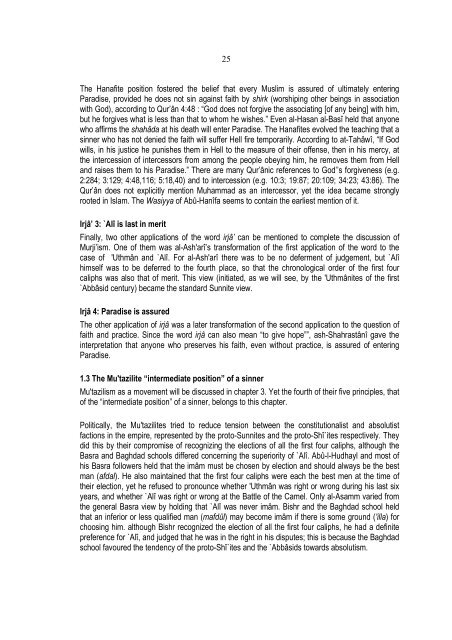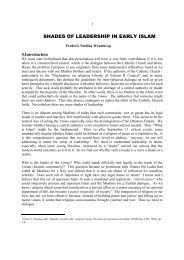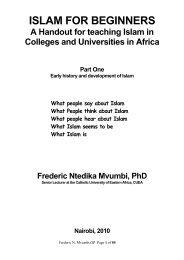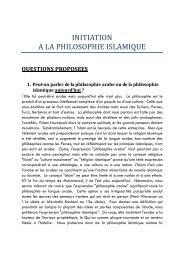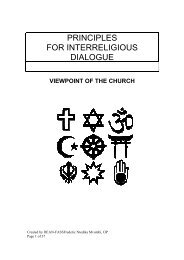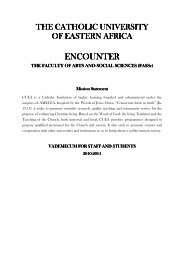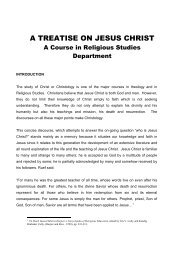INTRODUCTION TO ISLAMIC THEOLOGY.pdf - CUEA
INTRODUCTION TO ISLAMIC THEOLOGY.pdf - CUEA
INTRODUCTION TO ISLAMIC THEOLOGY.pdf - CUEA
You also want an ePaper? Increase the reach of your titles
YUMPU automatically turns print PDFs into web optimized ePapers that Google loves.
25The Hanafite position fostered the belief that every Muslim is assured of ultimately enteringParadise, provided he does not sin against faith by shirk (worshiping other beings in associationwith God), according to Qur’ân 4:48 : “God does not forgive the associating [of any being] with him,but he forgives what is less than that to whom he wishes.” Even al-Hasan al-Basî held that anyonewho affirms the shahâda at his death will enter Paradise. The Hanafites evolved the teaching that asinner who has not denied the faith will suffer Hell fire temporarily. According to at-Tahâwî, “If Godwills, in his justice he punishes them in Hell to the measure of their offense, then in his mercy, atthe intercession of intercessors from among the people obeying him, he removes them from Helland raises them to his Paradise.” There are many Qur’ânic references to God’’s forgiveness (e.g.2:284; 3:129; 4:48,116; 5:18,40) and to intercession (e.g. 10:3; 19:87; 20:109; 34:23; 43:86). TheQur’ân does not explicitly mention Muhammad as an intercessor, yet the idea became stronglyrooted in Islam. The Wasiyya of Abû-Hanîfa seems to contain the earliest mention of it.Irjâ’ 3: `Alî is last in meritFinally, two other applications of the word irjâ’ can be mentioned to complete the discussion ofMurji’ism. One of them was al-Ash'arî’s transformation of the first application of the word to thecase of 'Uthmân and `Alî. For al-Ash'arî there was to be no deferment of judgement, but `Alîhimself was to be deferred to the fourth place, so that the chronological order of the first fourcaliphs was also that of merit. This view (initiated, as we will see, by the 'Uthmânites of the first`Abbâsid century) became the standard Sunnite view.Irjâ 4: Paradise is assuredThe other application of irjâ was a later transformation of the second application to the question offaith and practice. Since the word irjâ can also mean “to give hope””, ash-Shahrastânî gave theinterpretation that anyone who preserves his faith, even without practice, is assured of enteringParadise.1.3 The Mu'tazilite “intermediate position” of a sinnerMu'tazilism as a movement will be discussed in chapter 3. Yet the fourth of their five principles, thatof the “intermediate position” of a sinner, belongs to this chapter.Politically, the Mu'tazilites tried to reduce tension between the constitutionalist and absolutistfactions in the empire, represented by the proto-Sunnites and the proto-Shî`ites respectively. Theydid this by their compromise of recognizing the elections of all the first four caliphs, although theBasra and Baghdad schools differed concerning the superiority of `Alî. Abû-l-Hudhayl and most ofhis Basra followers held that the imâm must be chosen by election and should always be the bestman (afdal). He also maintained that the first four caliphs were each the best men at the time oftheir election, yet he refused to pronounce whether 'Uthmân was right or wrong during his last sixyears, and whether `Alî was right or wrong at the Battle of the Camel. Only al-Asamm varied fromthe general Basra view by holding that `Alî was never imâm. Bishr and the Baghdad school heldthat an inferior or less qualified man (mafdûl) may become imâm if there is some ground ('illa) forchoosing him. although Bishr recognized the election of all the first four caliphs, he had a definitepreference for `Alî, and judged that he was in the right in his disputes; this is because the Baghdadschool favoured the tendency of the proto-Shî`ites and the `Abbâsids towards absolutism.


